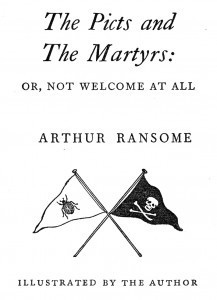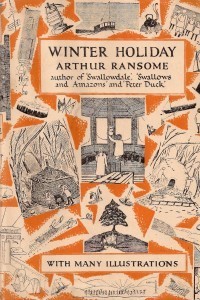Book Week: Messing About In Boats
 Arthur Ransome is one of the authors who defines my childhood. They were important books to my Dad, and he made sure I had my own copies of them – solid paperbacks using Ransome’s own, amateurish but charming internal illustrations on the cover.
Arthur Ransome is one of the authors who defines my childhood. They were important books to my Dad, and he made sure I had my own copies of them – solid paperbacks using Ransome’s own, amateurish but charming internal illustrations on the cover.
I’m not sure why I started with Coot Club (1934) and The Big Six (1940, but I have a vague feeling that a TV series was responsible. The first book tells the story of studious brother and sister Dick and Dorothea, who go to stay with a family friend in a houseboat on the Norfolk Broads, make friends with the local kids, and get involved in protecting the eggs of local birds from careless holidaymakers as well as overt thieves. Historical environmentalism! The sequel is about how their friends, the Death-and-Glories, are framed for a crime, though I remember it mostly for the scene in which one of them has a wobbly tooth and uses the string-and-door trick. Ouch!
I don’t know why these stories appealed so much, as I was very much an anti-swimmer as a kid and wasn’t overly keen on boats – the one time I went out in one I got scared silly just getting to the damn thing, and I’m pretty sure I impaled my leg on a fish hook.
But it was the characters, of course – for me, it’s always the characters. Clever Dick and Dorothea, and their boat-mad friends, heroic Tom, the elegant blonde twin girls known only as Port and Starboard, and the rough-and-tumble Death-and-Glories completely captured my imagination.
But I remained skeptical about the rest of the series. Next I read The Picts and the Martyrs (1943), another Dick and Dorothea book, only one set at another holiday destination, the Lake District in Cumbria. This was a joyous book as well, all boats and horrible aunts, madcap adventures and two girls, Nancy and Peggy Blackett, who are PIRATES I tell you and thus shouldn’t have to wear pretty dresses and put up with aunts.
I was hooked.
 Back at the beginning of the series, to my surprise and frustration, it wasn’t from the point of view of my beloved D’s or Amazons at all, but some kids called Walker with their boat the Swallow… And, oh. The boats, the boats. The strange wild combination of real adventures and make believe. The war between the Swallows and the Amazons, who want the same camping ground, but swiftly realise that they are kindred spirits. The poor uncle who just wants to write his damned book, but finds himself undersiege by his horrid nieces who are determined to make him play pirates with them, no matter what.
Back at the beginning of the series, to my surprise and frustration, it wasn’t from the point of view of my beloved D’s or Amazons at all, but some kids called Walker with their boat the Swallow… And, oh. The boats, the boats. The strange wild combination of real adventures and make believe. The war between the Swallows and the Amazons, who want the same camping ground, but swiftly realise that they are kindred spirits. The poor uncle who just wants to write his damned book, but finds himself undersiege by his horrid nieces who are determined to make him play pirates with them, no matter what.
Children don’t have childhoods like this any more. Maybe they never did. Because ‘if not duffers won’t drown’ is all very well but I’m sorry, my kids are NOT going to be given free rein, a sailboat and a frying pan from the age of seven.
So much of my cultural stash and love of this time period comes from these books. Campfires and milk straight from the cow, tarns and moors, pirates and sailing boats, the taste of cooked eel, the smell of charcoal, girls in red caps and boys who keep promises to their mothers. Mining for gold. Walking across mud flats. Pigeons. Snow. Mumps. Semaphore and other codes. Travelling to the North Pole. Did I mention PIRATES?
But these are also the books that taught me about meta. Because the one I could never finish was Peter Duck. I knew full well that Peter Duck was an imaginary character made up by one of the kids, so when I started reading the book where he was a real person interacting with the Walkers, my brain threw me right out. I’ve still never read that one. Why would I? It obviously never happened.
(It was suggested to me in later years that Missee Lee, the story in which they are all kidnapped by Chinese pirates, is also a ‘pretendy’ adventure. LIES.)
As an adult, Nancy Blackett is the character who has stayed with me. The girl who didn’t want to be a lady, because she was a PIRATE. Fearless, bold and ruthless. How did she grow up? What did the world hold for a woman with that much crazy, untapped imagination?
The world of Cumbrian lakes and messing about in boats was as alien to me as Narnia or Oz, and I lapped it up. I read them over and over, and got more out of them each time. These books are embedded in my veins.
===
A few people have already risen to my challenge of posting about favourite childhood books this week! Check out Terri on Enid Blyton and Thief of Camorr on inspiring books.



